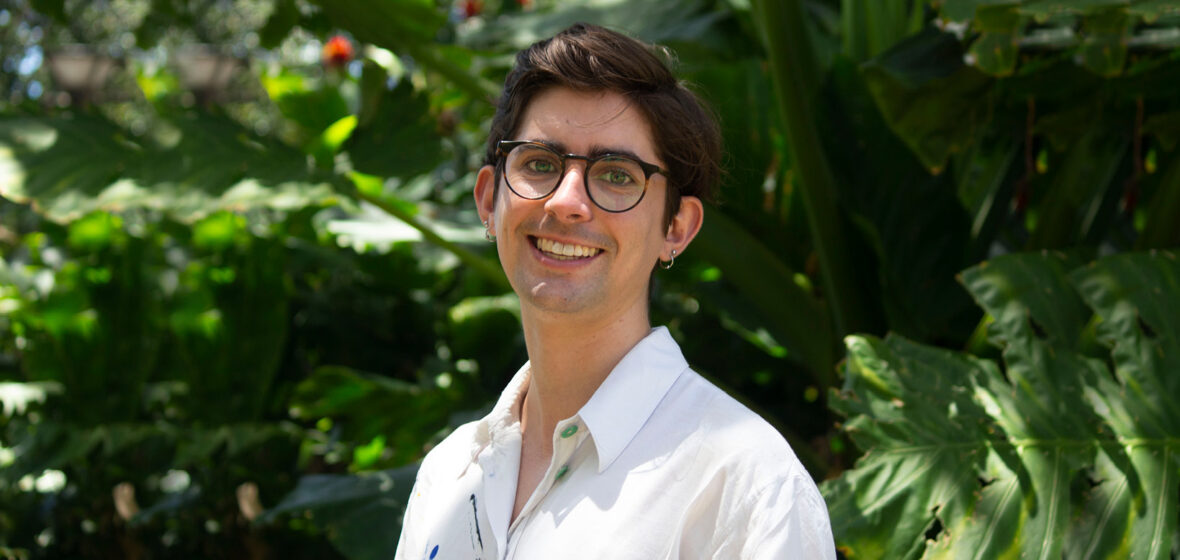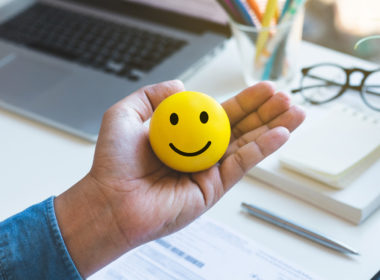“If there is consultation with people with disabilities when workplace structures and expectations are first set up, the workplace would be far more equitable.”
Lawyers are typically high achievers, and a lot is expected of them – they are expected to be at the top of their game at all times. But it's important that we create inclusive spaces for people with disability, including mental health issues, to encourage equal participation in our profession.
At the start of this month, on the International Day of People with Disability, solicitor Oliver Moore spoke to an audience at Legal Aid NSW about perceptions of disability in the workplace. And he spoke from the heart.
Moore has lived experience with disability, having been diagnosed with both Bipolar Type II and anxiety. “For someone with a disability like this, which impacts on my mental health, being able to work as a lawyer has proved very challenging.
“I know I’m not alone in this challenge in bringing my whole self to work as a queer person, and as someone with a disability.”
Views on disability in the workplace
Moore has found his way to make a difference through working in the law, but has had to navigate workplace structures and attitudes to get there. He has been heavily influenced by his involvement in disability rights advocacy, which is focused on finding a way for people with disability to feel safe and confident in the workplace.
As Moore explains, in many workplaces, particularly in the legal sector, disability is viewed through the lens of the medical model: “In the medical model, the person with a disability is seen as the one with the problem, and the burden is placed on them to ‘fix’ it. The expectation is that they must ask the workplace to try to accommodate them, to make adjustments. The implication is that something is wrong with them – they have a deficit, and being ‘normal’ in the workplace is something they need to aspire to and work towards. Further, people are made to feel unreasonable or difficult for asking for reasonable adjustments.”
Moore experienced this himself. When he applied for positions with legal organisations, he was asked to disclose in detail how adjustments would need to be made for him if he were to work there. It was unclear to him how the employer would be using this information: “It felt like my condition was anticipated to be a problem, a need for the organisation to deviate from its usual practices.”
Moore continues: “My experience, and of others I’ve spoken to, is that when a person with a disability applies for a position in a law firm you start from a position of disadvantage: it’s unclear to many of us when to disclose, and what to disclose. There is a fear of discrimination from the very start of the application process.”
“One issue,” Moore adds, “is the principles on which most legal workplaces are based. The norms and structures – the five-day week, long hours, expectations that a person will be on top of their game, never suffering fatigue – have been developed by people who meet those criteria, who don’t have a mental illness or other disability, or at least are capable of ‘masking’ to hide this.
“It would be helpful if employers began from the premise that you were not expected to be normal or to be working towards being normal. If, instead, there is consultation with people like myself when workplace structures and expectations are first set up, the workplace would be far more equitable.”
 Oliver Moore
Oliver Moore
The social model of disability
The social model of disability offers an alternative to the narrow lens of the medical model, Moore adds.
“This model acknowledges that, for many people, the disadvantage for people with disability often comes from the structural barriers and people’s response to disability, as much as the disability itself. In other words, the workplace has embedded barriers that people with disability need to negotiate. So the problem is seen to be based not in the individual, but in the workplace. Hence the employer will need to look at ways of removing those barriers, so people with disabilities can have the same rights as anyone else in the workplace.”
Also, says Moore, the employer needs to be proactive with the person with disability, rather than the other way around. They should be explicit, volunteering the information up front that they have policies in place for disabled employees, and that they welcome people with disabilities.
“In other words,” Moore says, “inclusion should be embedded in the philosophy – and practices – of the workplace.”
Inclusion, Moore notes further, is not just about accepting that people with disabilities, including mental health problems, should be accepted as equal participants in a workplace. “It’s also about a workplace that welcomes women, people of diverse gender and sexuality like myself, people from many cultural backgrounds, people in different age groups, and, of course, First Nations people.”
Inclusion has been found to significantly impact mental health. Diversity Council Australia’s recent Inclusion@Work survey found that working in an inclusive workplace significantly enhances the mental health of workers.
This was Moore’s experience when he sought an employment solution that would work for him. When he completed an Arts/Law degree in 2017, he took up a graduate legal policy position in the public service, but found this had a severe impact on his mental health.
“Lawyers are typically high achievers, and a lot is expected of them – they are expected to be at the top of their game at all times. And we are the ones who expect it from ourselves. My own perfectionism, a common characteristic of lawyers, hasn’t helped either – I’ve felt I couldn’t live up to my own expectations of myself.”

Moore adds, “I felt that as a lawyer there is a stigma attached to saying that you have a mental illness.”
This is borne out by research conducted in October 2021 by the Australian College Of Applied Professions’ Nationally Representative Survey of Australian Workers, which found that two-thirds (66 per cent) of survey participants working in law said they would hide a mental or physical health condition from work to avoid being judged or discriminated against, compared to just over half (53 per cent) of all industries.
Mental health issues can arise in response to environmental as well as genetic issues, Moore observes, and this is particularly the case in the legal profession.
The Minds Count Foundation has observed that this is the case in all area of the profession, and at all stages in a legal career: “Poor mental health is a significant problem throughout our profession – [from] the stereotypical young lawyers in large law firms working long hours under pressure to produce thousands of billable hours each year … to small and mid-size firms, sole practitioners, senior lawyers, judicial officers, and those in corporate and government environments … [and] it appears to start while aspiring lawyers are still in law school.”
‘I’ve found a way to thrive’
Moore was very pleased to be able to avoid many aspects of the standard stress-inducing legal environments by finding a place in a welcoming and affirming workplace. For the past two and a half years, he has been employed as a solicitor by Legal Aid NSW in the Your Story Disability Legal Support program. This program empowers people with disability to safely share their story with the Disability Royal Commission and connect with local support services. Moore does a mix of policy, client and outreach work in this role, a combination that works well for him.
Moore advises people who would like to go to the Commission, assists in preparing submissions, and provides referrals if Your Story cannot help them. It’s also given Moore a chance to do outreach to demographically and geographically diverse populations. Creating a disability-aware and trauma-informed service has led to positive feedback from clients and a desire for a similar service to continue, says Moore. He hopes that the lessons learnt from clients will not be lost to the profession when the Commission ends.
Legal education is another area where Moore has been able to make a contribution: this year he lectured to law students at the University of Technology, Sydney on the subject Law and Mental Health, and his lived experience was, he believes, “one of the reasons I was selected to teach this course, and had a high degree of engagement with students.”
Moore adds, “I am fortunate to have found work that aligns with my own values and allows me to work less than a full-time week.”
Masking the effects of a mental health condition is exhausting, Moore affirms, and rest time is needed. His current position with Legal Aid enables him to work part time.
While he affirms that he would find it useful to increase his working hours for financial reasons, he notes: “I’m conscious that I need to see myself as ‘a whole person’, and live in a way that lets me enjoy life as much as I can. We’re not just lawyers.
“And part of that is acknowledging openly that I have a disability. This makes it possible for me to access a community with issues like my own: we have a common purpose and share peer support. The Disability Network at Legal Aid, for example, has been doing wonderful work, and I give my thanks to my colleagues.”
When you care for yourself, says Moore, and are realistic about what you can do, then you can work in a way that’s aligned with your values. In Moore’s case, this means being entrenched in the fight for disability rights.
“It’s still a challenge sometimes, but I’ve found a way to thrive in the profession and beyond.”




